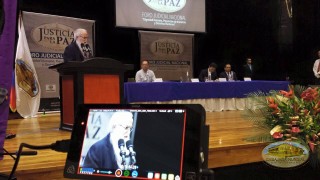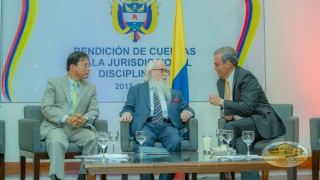The National Judicial Forum “Human dignity, presumption of innocence and human rights”, a space to think and discuss about conflict, victims and public management
An important event took place in the Governors Hall, installation of the Government of Valle del Cauca, in the city of Cali - Colombia, on November 20th, 2015.
With the assistance of more than 200 people, expert lecturers in issues of justice, human and victim rights, got together to discuss and reflect towards the strengthening of justice, the recovery of the truth in the midst of conflict and policies of respect for human rights.
The victims, transitional justice, human rights, and the strengthening of Democracy
The theme of the first table revolved around the victims, human rights, constitutional dogma, and the application of punishment in transitional justice.

The first intervention was given by Dr. William Soto, Executive President of the GEAP, who carried out an ongoing tour of human rights' violations, which are becoming evident in different parts of the world in children, women, and against civil groups, because of their religious beliefs.
He denoted that it does not matter where the events take place in the world, indisputably consequences have an impact on world peace. The number of refugees and those displaced by violence that demand the restitution of their lands and children, used as combatants, is increasing.
For Dr. Soto, a justice for peace must be grounded in the truth and respect for human rights; an autonomous and independent justice brings peace. Finally, he supported the peace process in Colombia, indicating that the Global Embassy of Activists for Peace is ready to support the construction of peace that the human family so desperately needs.
Dr. Camilo Montoya, as coordinator of the Projects Council, identified three models of justice in the world and raised the question of which model of justice would be applicable in transitional justice.
In the presence of this, he introduced the function of punishment and the existing theories regarding it, to point out that transitional justice is a justice that is applied only in contexts of transition.
He recognizes that in a transitional justice, all crimes cannot be investigated, tried and punished, but also admits that no crime can be thought to be tried; he also stressed that the peaceful solution of conflicts will always be the best option.
In his speech, Dr. Oscar Valero Nisimblat, president of the Contentious Administrative Chamber of the Administrative Court of Valle del Cauca, broke down the preamble of the Colombian Constitution, to identify its transcendence and indicate that for him all the content of the Charter can be condensed into him and the two following articles. Then he landed this issue in the field of human rights.

"In human dignity lies the entire budget of what human and fundamental rights are."
Peace scenarios and post-conflict perspective
The second and last table was composed of Dr. Fabio Cardozo, high councilor for Peace and Human Rights in Valle del Cauca, and Dr. Alejandro Gutiérrez, community defender of the Valle del Cauca Regional Ombudsman.
The high commissioner made a historical tour of the conflict in Colombia, pointing out its economic genesis. His intervention was focused on the concern of what the Colombians will get in the post-conflict process, clarifying that its position is hopeful, that the desired results will be achieved and, therefore, the agreements will last.
Among others things, he said that the economic development model of the country does not work and suggests revising the exit process of the conflict if it is to operate positively.
For its part, the Ombudsman presented the official figures on October 2015, in which the victims in Colombia reach seven million; he indicated that the country is still awaiting progress "in an analysis that allows establishing the effective enjoyment of the rights of the communities at risk of displacement, since the management emphasis has been in the delivery of humanitarian attention and compensation, but without a vision on effective enjoyment of rights.



